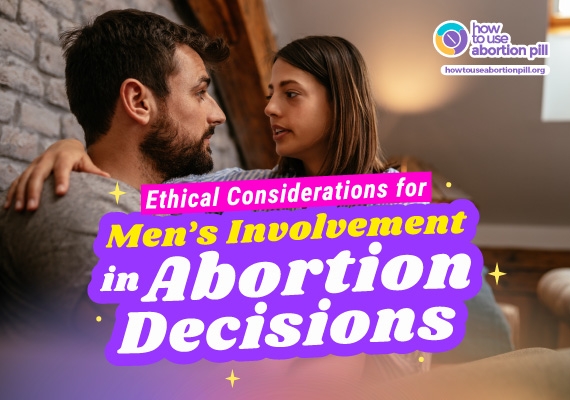Abortion is a topic that can bring up deep emotions, moral dilemmas, and intense debate. While much of the discussion rightly focuses on women’s rights and autonomy, the role of men in these decisions in hetrosexual relationships is a nuanced and delicate aspect that warrants careful consideration. In this blog, we will explore the ethical considerations surrounding men’s involvement in abortion decisions, acknowledging the complex dynamics at play.
Understanding Men’s Role in Reproductive Decisions
When discussing abortion, it’s essential to acknowledge that the decision impacts both partners in a relationship, especially in committed partnerships. Legally, the decision to have an abortion typically rests with the woman, reflecting the principle of bodily autonomy. However, this legal reality doesn’t diminish the emotional and relational stakes men may feel when faced with an abortion decision.
From a moral standpoint, some argue that men, as potential fathers, should have a say in the decision. Yet, this raises ethical questions about the balance of rights between the woman, who bears the physical, emotional, and social burdens of pregnancy, and the man, who may have emotional or moral concerns about the potential outcome.
Autonomy and Bodily Rights
At the heart of the abortion debate is the issue of bodily autonomy. A woman’s right to make decisions about her own body is a fundamental aspect of reproductive rights. This principle is crucial in ensuring that women have control over their reproductive lives, free from external pressures.
However, when considering a man’s involvement, the question arises: how do we balance a man’s desire to be involved in the decision with a woman’s right to autonomy? While a man’s perspective is valuable, the ethical priority often lies with the woman’s right to choose, as she is the one directly affected by the pregnancy.
Ethical Frameworks: Different Lenses on the Issue
To better understand the ethical considerations, it’s helpful to examine the issue through various ethical frameworks:
- Utilitarianism: A utilitarian approach might argue for the decision that brings the greatest overall happiness or least harm to the couple or family. This could mean considering the long-term implications of the decision on both partners and their existing or future family.
- Deontological Ethics: A deontologist would focus on the rights and duties of the individuals involved. From this perspective, the duty to respect a woman’s autonomy and bodily rights might outweigh a man’s interest in the decision.
- Feminist Ethics: Feminist ethics emphasize the importance of prioritizing women’s voices and experiences in female reproductive decisions, challenging traditional power dynamics and advocating for greater equality.
Communication and Consent: A Path Forward
One of the most critical ethical considerations in abortion decisions is the importance of open and honest communication between partners. While the final decision may rest with the woman, ensuring that both parties engage in an informed and respectful dialogue is essential. Informed consent, in this context, means that both partners fully understand the implications of their choices and that the decision is made with mutual respect and understanding.
Social and Cultural Influences
Cultural norms and expectations around masculinity can significantly influence a man’s perspective on his role in abortion decisions. For some men, societal expectations to be providers or protectors might make them feel a strong sense of responsibility or attachment to the potential new family. However, these feelings must be balanced with the understanding that the woman’s experience and rights are paramount in this context.
Moreover, societal stigma surrounding abortion can affect men as well, potentially leading to feelings of exclusion or inadequacy. It’s important to acknowledge these emotions and ensure that men have access to support systems that help them navigate these complex feelings.
Legal Implications: Rights and Reforms
Currently, legal frameworks generally prioritize a woman’s right to choose, with limited legal rights for men in abortion decisions. While some argue for greater male involvement, potential legal reforms in this area raise significant ethical questions. Increasing men’s legal rights in abortion decisions could undermine women’s autonomy and lead to conflicts that ultimately harm both parties.
Real-Life Complexity
To illustrate the complexities of men’s involvement in abortion decisions, consider a few hypothetical scenarios. In a committed relationship, a couple discovers an unplanned pregnancy. The woman feels unprepared to have a child, while the man is excited about becoming a father. Here, the ethical challenge lies in balancing the man’s enthusiasm with the woman’s readiness and rights. In a casual relationship, a woman and a man face an unplanned pregnancy. The woman decides to have an abortion, while the man wishes to keep the child. In this case, the ethical considerations shift, emphasizing the woman’s autonomy given the less established relational context.
These scenarios highlight the varying dynamics that can influence abortion decisions, underscoring the importance of context in ethical deliberations.
Striking a Balance
The ethical considerations surrounding men’s involvement in abortion decisions are complex and multifaceted. While it is essential to respect a woman’s autonomy and right to choose, it is also important to acknowledge the emotional and relational stakes for men. Open communication, mutual respect, and understanding are key to navigating these difficult decisions.
Ultimately, the conversation about men’s involvement in abortion decisions must be approached with empathy and a commitment to upholding women’s rights while recognizing the broader relational dynamics at play. As society continues to grapple with these issues, ongoing dialogue is crucial in fostering a more nuanced and compassionate understanding of reproductive ethics.
If you or anyone you know is looking for a resource for an abortion with pills, visit our website for comprehensive information on how to self-manage your abortion. HowToUseAbortionPill is a digital platform that provides essential information and resources on the abortion pill. With the aim to make access to abortion easier, it shares information about what to consider beforehand, where to find reliable pills, how to use them safely, what to expect during the process, and when to seek medical assistance if needed.
